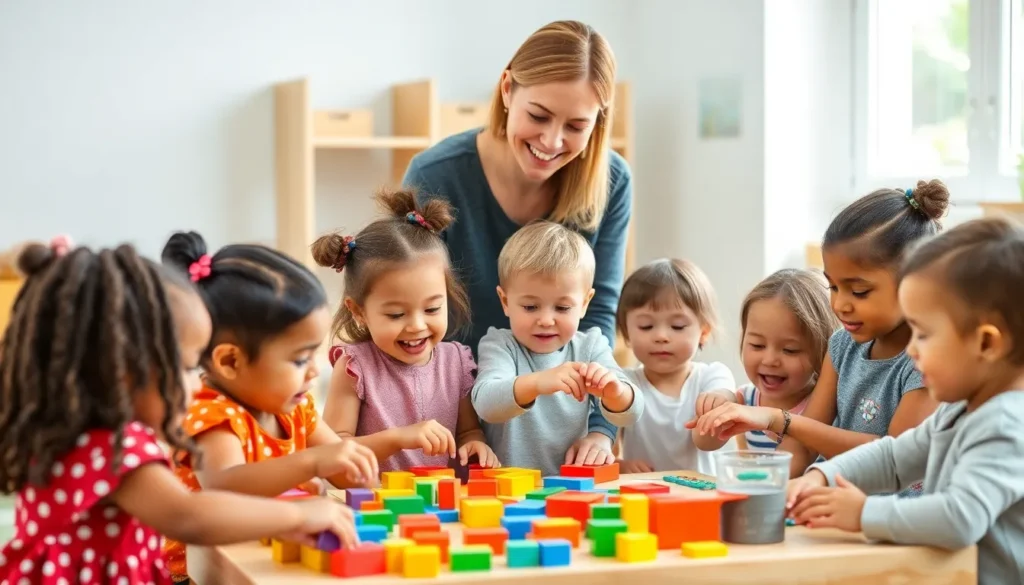Table of Contents
ToggleIn a world where traditional teaching methods often feel like herding cats, Montessori education offers a refreshing alternative that’s as engaging as it is effective. Imagine a classroom where kids aren’t just sitting at desks but are exploring, experimenting, and actually enjoying the learning process. That’s the magic of Learn and Play Montessori.
Overview of Learn and Play Montessori
Learn and Play Montessori emphasizes a child-centered approach that fosters independence and creativity in a supportive environment. Children engage in hands-on activities that stimulate their natural curiosity and desire to learn.
Key Principles of Montessori Education
Montessori education revolves around several key principles. Child-led learning allows students to choose activities that interest them. Mixed-age classrooms promote collaboration and peer learning, enabling younger children to learn from older peers. The prepared environment features materials designed to be accessible and encouraging. Lastly, the role of the teacher shifts from traditional instruction to a guide who facilitates exploration and discovery among students.
Benefits of Montessori Learning
Montessori learning offers numerous benefits for child development. Children develop independence through self-directed activities. Critical thinking skills flourish as they solve problems in real-world contexts. Emotional growth occurs as they practice self-regulation and resilience in a nurturing space. Additionally, social skills improve through interaction in diverse groups, fostering respect and understanding among peers. Academic success often results from the strong foundation built in a Montessori environment, as children cultivate a lifelong love for learning.
Activities in Learn and Play Montessori

Montessori education prioritizes engaging activities that nurture holistic development. The activities at Learn and Play Montessori revolve around practical skills and sensorial experiences, ensuring children grow intellectually and socially.
Practical Life Skills
Practical life skills form a core component of Montessori learning. Children engage in tasks like pouring, sorting, and sweeping, promoting independence. Each activity enhances fine motor skills and coordination. Working with real tools cultivates a sense of responsibility. Daily routines encourage cooperation and confidence. Learning to care for themselves and their environment fosters respect and enhances social awareness among peers.
Sensorial Activities
Sensorial activities offer children hands-on experiences that stimulate their senses. Materials like textured fabrics, colored filters, and sound boxes support sensory exploration. Engaging with these materials helps children differentiate shapes, sounds, and colors, promoting cognitive development. Additionally, sensorial experiences encourage observation and analytical thinking. These activities enhance language development as children describe their findings. Discovering through the senses deepens understanding and appreciation of the world around them.
The Role of the Educator
The educator plays a vital role in the Montessori approach, guiding children’s learning journeys.
Facilitating Independent Learning
Educators encourage self-directed exploration. They observe children and tailor support to their interests and needs. When children take the lead, they develop essential decision-making skills. Educators use questions to stimulate critical thinking, prompting children to think deeply about their experiences. Providing choices fosters autonomy, helping children discover their passions and capabilities. The focus remains on promoting independence, allowing children to grow at their own pace.
Creating a Prepared Environment
The prepared environment is crucial in Montessori education. Educators carefully arrange materials to facilitate meaningful interactions. These materials are accessible and age-appropriate, encouraging children to engage freely. Organization and simplicity in the classroom design support exploration and learning. Resources align with children’s developmental stages, aiding cognitive and social growth. Communication among educators ensures the environment adapts to the evolving needs of the children, fostering a dynamic and enriching educational experience.
Parent Involvement in Montessori
Parent involvement plays a crucial role in enhancing the Montessori experience. Engaging at home reinforces the principles taught in the classroom.
Supporting Learning at Home
Parents can support learning at home through practical activities. Establishing a routine with time for exploration promotes independence. Using ordinary tasks like cooking or gardening fosters responsibility and collaboration. Parents can provide materials that encourage curious exploration, such as books and art supplies. Encourage children to make choices during these activities, promoting autonomy. Simple discussions about daily experiences also strengthen language skills.
Collaborating with educators can ensure continuity between home and school. Sharing insights about children’s interests allows for personalized learning approaches. Effective communication creates a supportive atmosphere that enhances children’s educational journeys.
Building a Montessori Community
Creating a Montessori community involves active participation from parents. Attending school events and workshops fosters connections between families. Collaborating with other parents promotes shared experiences and learning opportunities. By forming interest groups, parents can discuss strategies to support their children’s development.
Encouraging parent-to-parent mentoring builds a stronger community. Networking with other families enhances a sense of belonging. Together, families can advocate for school improvements and support broader educational initiatives. Engaging in community service projects also demonstrates the values of responsibility and cooperation instilled through Montessori principles.
Learn and Play Montessori stands as a beacon of innovative education where children thrive in a nurturing environment. By embracing a child-centered approach and promoting hands-on learning, it cultivates essential life skills and a passion for discovery. The unique classroom dynamics encourage collaboration and independence, allowing each child to flourish at their own pace.
With the involvement of dedicated educators and supportive parents, the Montessori experience becomes even richer. This collaborative effort not only enhances individual growth but also fosters a strong community spirit. As children engage in meaningful activities and explore their interests, they embark on a lifelong journey of learning and personal development.




